- Joined
- Mar 22, 2008
- Messages
- 11,124
- Reaction score
- 218
How long before the US invades Venezuela?
How long before the US invades Venezuela?
I dont think Maduro regime will last that long.
I'm reasonably sure they are open to the offer of a very generous Oil for Food programme with any of their neighbors who have excess inventory of consumables for trading.
Better act quick though, the latest news reports say that Venezuela's oil output is reaching record low this year, because their (nationalized) oil extraction and processing infrastructure is falling apart after decades of neglect without repairs nor technological renovation.
In a few years, they will be sitting on a pool of oil, without the means of pumping it up. Would be very amusing to see Venezuela begs other oil companies to come in again to do the hard work, after kicking them out a mere generation ago.
They are actually against importing food or receiving aid.

When it comes to buying food on his government-mandated day of the week, William, a 44-year-old farmer, doesn't mess around. At sunset each Tuesday, William, a father of two, joins a line of dozens of people outside the Unicasa supermarket in central La Victoria, 34 miles west of Caracas. William and a friend spend the night taking turns sleeping on the street, with one of them standing watch at all times to guard against robbers, line-cutters, and rats. When it rains, they take shelter under a palm tree, waiting for dawn. Their weekly ritual is the only way to guarantee a good spot in line the next morning, when the supermarket begins distributing basic foodstuffs like rice and cooking oil.
When morning arrives, William and his friend stand in line under the piercing sun, enduring temperatures of up to 95 degrees. At noon, they finally pass through a cordon of police and National Guardsmen to enter the supermarket and claim their prize for 18 hours of hell: the right to purchase two kilograms of cornmeal and one kilogram of pasta. "I am doing this because I have children," William says. In the old days, he always voted for President Hugo Chávez and his successor, Nicolás Maduro. "How can this be happening? We have the world's largest oil reserves, but we don't have food."
Many Venezuelans are asking those very same questions. The food shortage, precipitated by Chávez's economic policies and a precipitous drop in oil revenue, is the worst in the country's history. It has led the government to limit purchases of basic foodstuffs and set their prices. Nonetheless, basic goods such as coffee, sugar, rice, milk, pasta, toilet paper, hand soap, and detergent remain impossible to find. According to Datanalisis, the country's leading polling agency, over 80 percent of regulated foodstuffs have vanished from store shelves. As a result, many Venezuelans now make do with a single meal a day, or resort to rustling through garbage bins to find food. Others have begun hunting pigeons, dogs, and cats, as Ramón Muchacho, the mayor of the Chacao borough in Caracas tweeted.
Maduro, who succeeded Chávez in March 2013 and may face a recall vote this year, seems to have no answers for the unfolding crisis. And as temperatures rise, shortages deepen, and inflation explodes, his tenure is increasingly at risk thanks to the shortsighted economic controls and state expropriations of private companies championed by his mentor, whose dreams of creating a Socialist state are now in tatters.
Venezuela's impoverishment stands in stark contrast to the promises Chávez made when he first ran for president in 1998, when he often claimed that many of the country's poor had been reduced to eating dog food as a way of demagoguing the previous pro-West, capitalist government. He promised to reduce the country's income inequality and poverty rate by redistributing the country's oil wealth. In 2003, after surviving a failed coup and a nationwide strike aimed at forcing him from office, Chávez decreed price and foreign exchange controls in order to stop a run on international reserves. Under his plan, the government decided who would receive dollars, with the intention of delivering them to companies and individuals who qualified. The plan imposed foreign exchange controls and set a fixed exchange rate with the dollar. But the government didn't provide enough dollars under the exchange controls, inadvertently giving birth to the black market. Later, the government established two additional rates, keeping the initial rate for imports of basic foodstuffs and medicine, two others for certain industries, and another for all other sectors under government control. This year, the government simplified things, establishing just two rates: one for foodstuffs medicine, and one for everything else. But the black market rate is now Venezuela's de facto exchange rate, reflecting the real costs of goods and services.
Starting around 2005, Chávez also began expropriating businesses by the dozens, claiming that many weren't producing or operating to his standards. By 2015, over 1,200 private companies had been nationalized, seriously denting local production of food, medicine, and oil - the country's largest export. Many oil production facilities now stand idle. This is due to a number of factors: low oil prices, a lack of investment, the diversion of oil funds to social programs and government campaigns, and the flight of foreign investors.
Chávez also used Venezuela's oil wealth to artificially depress prices on over 40 products, largely as a tool to maintain support among the country's poor. It worked well enough when oil prices were high and the government had the cash to import goods and subsidize consumption. But when oil prices plummeted by over 50 percent last year, chronic shortages of food, medicine, and spare parts became acute, as the government slashed imports to conserve dollars to make foreign debt payments and avoid default. Now, the government doesn't have the dollars to sell to importers, who, in turn, can't buy goods abroad.
"The real problem is that imports have been reduced by 40 percent this year and by two-thirds since 2012," says David Smilde, a senior fellow at the Washington Office on Latin America. "There is simply not enough food to go around."
What happened next will not shock you. Venezuela's economy contracted 8 percent in 2015 and is expected to dip another 8 percent this year. And inflation is expected to top 720 percent this year. With government price controls in place, private companies can't import the raw materials they need. In May, Coca-Cola halted production at two of its bottling plants due to a sugar shortage. The country's largest brewer, Cerveceria Polar, has been unable to produce beer for more than a month because it hasn't received money to import malted barley (they plan to resume later this month, after taking out a loan).
"The government controls access to dollars, and outside banks won't lend money to Venezuelan producers because of the political instability. They won't get repaid," says Vanessa Neumann, president of the New York-based Asymmetrica consulting agency. "And the prices set by the government's economic interventionism of the past several years mean that producing food is economically unfeasible. The ultimate irony of all this is that it has exploded the social inequality and poverty that brought the Chávistas into power in the first place."
Many Venezuelans - confronted with long lines, chronic and acute food shortages, and the government's seeming inability to provide food - long for the good old days. "We didn't realize how good we had it before Chávez took power," says Sandra Londono, a 42-year-old hairdresser who charges clients food rather than money for doing their hair. She doesn't have time to stand in line, she says. "We never had food shortages before Chávez and his people took power."
Maduro, Chávez's handpicked successor, blames the country's crisis on an economic war being waged by nefarious foreign powers against his government. He claims that Venezuela's business elite - supported by the United States, Spain, Colombia's former President Álvaro Uribe, and others - have deliberately cut back production of foodstuffs to create shortages, hoping to detonate a social crisis that would unseat him.
Opposition leader Henrique Capriles Radonski and others disagree. "The only guilty party for the Venezuelan economic disaster is the present government," Capriles wrote in an op-ed on June 5 in Spain's El Pais. "The mismanagement and inefficient use of the oil bonanza that has already concluded, and the dismantlement of the production and commercial apparatus of the country, as well as constant fighting with businessmen have resulted in an humanitarian emergency."
Soaring inflation only makes matters worse. On May 1, Maduro raised the country's monthly minimum wage by 30 percent to 15,050 bolivars (about $1,500). That sounds like a big raise, but consider: Inflation is raging at more than 400 percent. For perspective, the average family of four needs 256,146 bolivars (about $25,700) a month to buy just the essential foodstuffs, according to the Documentation Center for Social Analysis. That works out to over 17 times the monthly minimum wage. A kilogram of meat or cheese now costs about one-third of the monthly minimum wage. "These prices are killing us," says Irene Lozada, a 56-year-old mother of four who spends five hours a day looking for food. "Each week prices are higher and higher. How can we survive?"
Lozada says she has no choice but to buy food on the black market from bachaqueros, people who illegally obtain food and resell it at steep markups. Although the government-established price for one kilogram of cornmeal is 190 bolivars (about $19), the black market price is 1,500 (about $150). Maduro, who could face a recall referendum this year, has sought to combat the bachaqueros - many of whom are his own supporters - and end food shortages by creating local committees to deliver food to the country's population. These roughly 15,000 Local Committees for Supply and Production (CLAPs), set up not by the government but by Maduro's United Socialist Party of Venezuela (PSUV), obtain food from the government and sell it to households. The CLAPs were set up two months ago with the intention of helping to fight against the bachaqueros and shortages.
Under the program, participants can theoretically buy basic foodstuffs every two weeks at subsidized prices. "Our local committee asked us to pay 2,000 bolivars [about $200] upfront to guarantee us the first bags," says Asia Loudres, a 47-year-old mother of three, her face drawn and haggard from worry. "We are still waiting for the food. And it's been more than a month. I have been feeding my children bananas and yucca for days."
Opponents claim that Maduro and the PSUV are using the committees to feed their supporters at the expense of the rest of the population, especially as food shipments have been diverted from supermarkets to the committees. It's a charge that some Chávistas don't deny. "The [committees] are political organizations to combat the economic war," Erika Farias, the governor of Cojedes, said at a pro-government rally on Wednesday. "The escuálidos" - Maduro's supper-class opponents - "don't belong."
As the food shortage worsens, a wave of supermarket lootings and attempted hijackings of trucks carrying foodstuffs has soared. According to the Venezuelan Observatory of Social Conflict, upward of 10 lootings or attempted lootings are occurring daily. There have been 254 cases of looting or attempted looting of supermarkets and stores since the start of the year.
Orlando Farias, the manager of a grocery store in the central industrial city of Maracay, knew there would be problems when a delivery truck pulled up to his store last week, followed by a group of motorcyclists. "The motorcyclists - supporters of the government - started pushing and shoving the others who had been waiting in line for hours, many of whom were elderly women," Farias says. "They tried to get ahead in the line, and we had to call the police. "But when they arrived, the police made matters worse by insinuating that we were hiding food from the people who were waiting. We had to show the officers our storeroom before they would believe us. I thought for sure we were going to be looted, either by the police or by the people outside. I never thought I would see people so desperate, so hungry."
That desperation has fed the protests against Maduro in recent weeks. On June 2, over 150 people from a working-class neighborhood tried to reach the presidential palace to protest the shortage of food and the diversion of foodstuffs from the supermarket where they were waiting to the CLAPs. They were repulsed by security forces firing tear gas and rubber bullets.
"The food crisis is going to get worse in June and July," Smilde says. "For the past year and a half the government has kept a lid on this by militarizing supermarkets and quickly snuffing out altercations in line and cases of looting. But it's not clear how long they can do this."
That's bad news for Maduro, whose approval rating is hovering around 25 percent and who would surely lose in a hypothetical recall election. His weight isn't helping. The plump Maduro - whom Chávez often chided for his weakness for fast food - continues to assure his countrymen that things are getting better.
"He's fat; his ministers are fat so they have plenty to eat even though we don't," says Londono. "I can't wait to vote against Maduro. He has to go."
How long before the US invades Venezuela?
Let us be clear: Even if Maduro is gone today, it will take generations for Venezuela to climb up from the abyss that Chavismo pulled them in years ago.
The remnants of a house that was left to rot from top to bottom for decades doesn't simply turns into a castle overnight when you hire a better housekeeper. You will actually have to rebuild it brick by brick from the ground up all over again.
Even if the opposition somehow manage to remove that mad man through democratic means, they would inherit all those problems he and his mentor created, with very little means to bring back the once-thriving industries that Chavez single-handedly destroyed.
Maduro's reign may be counted in months or years, but my guess is that by the time our children go to college, Venezuela would still be a shithole plagued by poverty and hunger, the on-going legacy of a failed Socialist system.
I'm reasonably sure they are open to the offer of a very generous Oil for Food programme with any of their neighbors who have excess inventory of consumables for trading.
Better act quick though, the latest news reports say that Venezuela's oil output is reaching record low this year, because their (nationalized) oil extraction and processing infrastructure is falling apart after decades of neglect without repairs nor technological renovation.
In a few years, they will be sitting on a pool of oil, without the means of pumping it up. Would be very amusing to see Venezuela begs other oil companies to come in again to do the hard work, after kicking them out a mere generation ago.
Would..
Is Chavez's daughter still the richest person in Venezuela? Is she going to use her 4 billion to help out or is she actually out in the fields putting in work with her dog?

Is Chavez's daughter still the richest person in Venezuela? Is she going to use her 4 billion to help out or is she actually out in the fields putting in work with her dog?
Jamaica has announced it is going to pay off oil debts it has with Venezuela with food, medication, and fertilizers, instead of cash.
The barter agreement comes at a time when Venezuela is suffering from acute shortages of basic products amid a major economic and political crisis.
Jamaica's government announced the deal last Friday, saying that the transfers will take place in the last quarter of this year and amount to $4 million.
The oil-for-basic products exchange is taking place within a regional agreement known as PetroCaribe that was signed in 2005 by Venezuela and 12 Caribbean States.
The deal requires the Caribbean nations to pay for half of the oil at market prices immediately. The remaining 50 percent can be paid up to 25 years later. A special "compensation mechanism" within the agreement allows for cash substitutes to be used to settle that delayed payment.
"Jamaica has been accumulating a debt with Venezuela since 2006, and it is perfectly legitimate to pay that debt with products" said Rolín Iguarán, an oil expert from the University of Zulia in Venezuela. "In this period of economic recession, Venezuela is returning to practices that were used in the 1940s."
Shortages of food and other basics are at the heart of Venezuela's current crisis, with few signs that things would get any better in the near or medium term.
This year clashes between security forces and angry crowds demanding food have killed several people. Last month over 120,000 Venezuelans flooded into neighboring Colombia to buy supplies, during a weekend in which border controls were temporarily relaxed.
Last week the human rights group Amnesty International accused President Nicolás Maduro's government of promoting forced labor with a decree that obliges all Venezuelan workers to be available to work in food production if required.
Iguarán, the energy expert, stressed Venezuela's long-running dependence on oil revenue to pay for importing basic goods. In the current context of falling oil prices, and falling production, he said barter deals like the kind just announced with Jamaica may soon spread around the Caribbean.
"They need oil and may also be producing something that Venezuela needs," he said.
Many details of the deal — which the Jamaican prime minister's office announced with a statement while Venezuela's presidential office kept silent — remain unclear. These include what food products will be involved and where the medication will come from, given that Jamaica does not have a significant pharmaceutical industry.
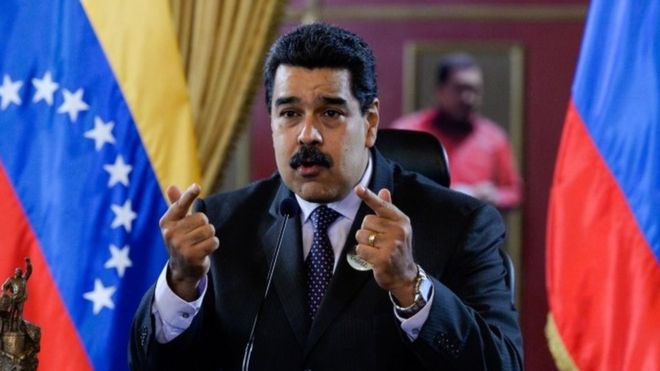
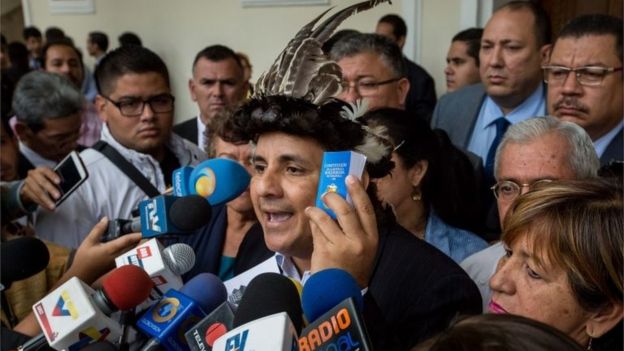
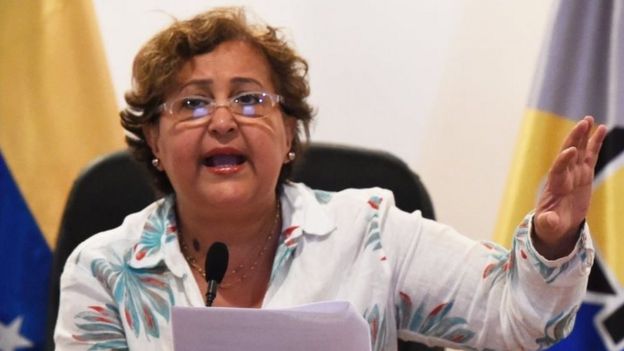
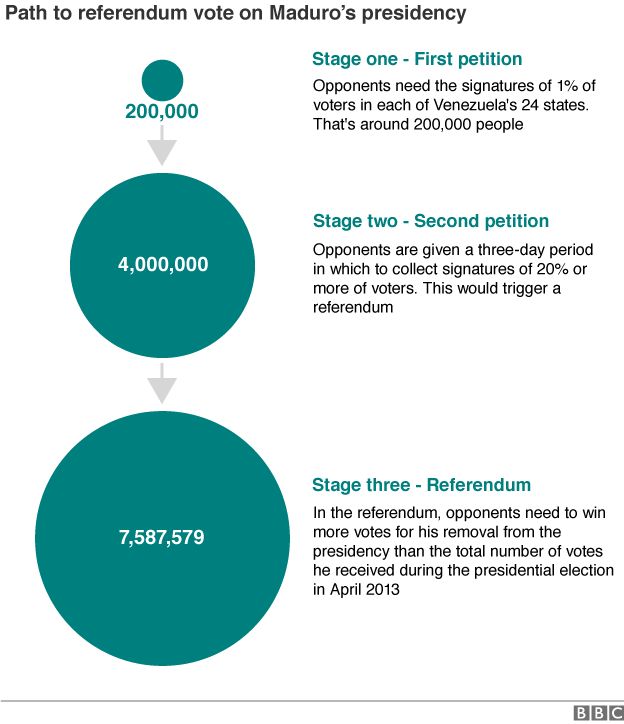
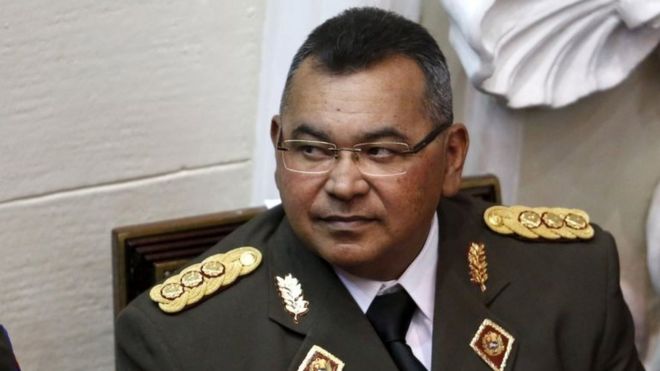
Venezuelan President Nicolas Maduro has named General Nestor Reverol, 51, as his new interior and justice minister.
The nomination came just a day after Gen Reverol was indicted by a US court on charges of abetting cocaine trafficking.
He served as interior minister once before, under the late President Hugo Chavez, and more recently headed the National Guard.
Mr Maduro dismissed the charges against Gen Reverol as a "US conspiracy".
'World record'
The president said Gen Reverol "broke the world record for capturing traffickers" when he was the head of Venezuela's anti-narcotics agency.
Prosecutors in New York announced on Monday that Gen Reverol and his former deputy at the anti-narcotics agency, Gen Edilberto Jose Molina, are suspected of receiving payments from drug traffickers in exchange for information about raids.
The prosecutors also alleged that the two men allowed shipments of narcotics to leave the country and let suspects go free.
Any assets they have in the US will now be seized.
Gen Molina, 53, is currently serving as Venezuela's military attache in Germany.
The outgoing Interior and Justice Minister Gen Gustavo Gonzalez will continue to head Venezuela's intelligence service.
Gen Gonzalez's relationship with the US was little better than that of Gen Reverol.
He was one of seven Venezuelan officials who in March 2015 was banned from entering the US as part of a US executive decree which also declared Venezuela "an unusual and extraordinary threat to the national security and foreign policy of the United States".
Relations between the United States and Venezuela have been tense for years with Venezuelan officials regularly accusing the US government of trying to topple President Maduro and the US criticising Venezuela for its human rights record.
